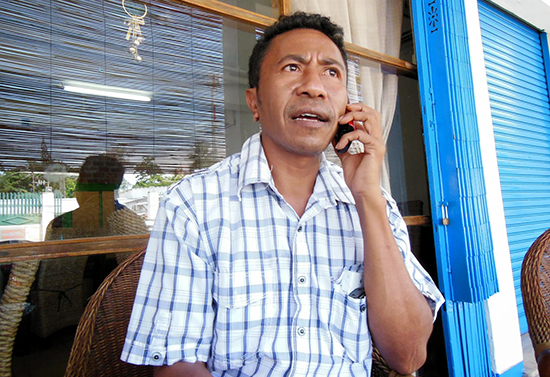
Writing for Timor-Leste's Independente, Bob Howarth argues for more homework over the worrying move to license journalists.
ANALYSIS: Tomorrow the world marks International Media Freedom Day and Timor-Leste journalists have special reasons to join colleagues around the world in celebrating.
Timor-Leste can be proud of its rating by the Paris-based international press freedom watchdog Reporters Sans Frontiers (RSF or Reporters Without Borders): 77th place (up 14 places).
Today Timor-Leste is on the map in the ranks of media freedom fighters with Tempo Semanal editor Jose Antonio Belo named by RSF as one of 100 “information heroes” in 2014. Belo’s citation for being chosen in a global field of information freedom fights is on Pacific Media Watch.
Parabens!
My association with this country and its crusading journalists began in January 2000 when a group of Timor-Leste’s senior journalists who survived the violence of 1999-2000 arrived in Brisbane, Australia, to attend a course on “Post-Conflict Reporting” run by the former Reuters bureau chief of Kosovo at the University of Queensland.
They agreed that the course was helpful but had nothing to return to in Dili as every single computer, proofer and all printing equipment had been destroyed. At the time I was editorial technology manager at Queensland Newspapers and on a national committee planning for disaster recover when we thought the world would end on January 1, 2000.
It didn’t end, planes didn’t fall out of the skies and we had warehouses full of equipment that had only two digits instead of the Y2K standard of four for year dates.
Mission Impossible
To cut a long story short, we rustled up nearly a tonne of non-Y2K computers, laptops, proofers and printing parts which Ansett Airlines flew free of charge to Darwin then Perkins Shipping brought them to Dili also free of charge. The longer story is at Cole Papers.
I flew into Dili on January 25, 2000, for the first of now 21 trips to help a dedicated team headed by editor Aderito Hugo Da Costa to produce the first edition of the Timor Post in time for Indonesian President Wahid’s visit on February 29. It was Mission Impossible to set up a newspaper from scratch, especially with constant power blackouts.
The Australian Army’s Ninth Force Support Battalion came to the rescue with constant power from their generators next door. One of my colleagues emailed the Post’s current masthead via the only internet connection at UN headquarters and the photo library was a CD I carried with leading Timor-Leste and Indonesian leaders.
Then February 28 became the longest day in my career when the journalists worked from early morning until 5am the next day to produce the first ever Tetum, Portuguese and English edition.
We solved the problem of no printing press by borrowing a new high-speed A4 photocopier at the old Paximus Lodge and ran off enough papers to toss to huge crowds awaiting Gus Dur’s arrival later that day.
Since then, TL’s media scene has boomed. New publications sprang up everywhere with the Independente the latest addition to the daily editions three years ago while STT now STL under Salvador Ximenes’s leadership literally rose from the ashes of 1999 to become a major player with its own TV presence and a reminder of tough times with a burnt printing press at his company’s gate.
So what of the future for TL’s media? As in other countries the slow but steady spread of the internet will not challenge traditional print media for years to come as experts predict the end of printed newspapers in the USA and Australia by 2020.
Vital role
And the rise of social media which prompted the “Arab Spring” and other historic events has seen the emergence of “citizen journalists” who play a vital role in fighting corruption and bureaucratic incompetence.
Efforts by governments around the world to control the free flow of information poses risks to democracy while a lack of proper training at university level and in newsrooms hampers professionalism.
What I find personally disturbing in TL, a country I’ve had a long association with and love, is the idea of “licensing” journalists.
My first question is: How do you define a journalist? Does someone who writes a popular blog on the internet qualify?
How good is journalism training in TL compared to other countries? As someone who has trained journalists in Hong Kong, Papua New Guinea, Solomon Islands, Fiji, The Gambia (West Africa), New Zealand and Australia and more recently at Padjadjaran University in Bandung and Udayana, Bali, I would recommend following Indonesia’s example.
It might be like the Wild West sometimes but Indonesia’s media set a standard for all of the region.
I hope, on International Media Freedom Day, that all stakeholders in the proposal to license TL journalists do their homework.
Licensing regimes
The following information on licensing was researched by journalism student Toni Mackey at Griffith University, Gold Coast, Australia:
Portugal licenses journalists. To get one of these licences you need your employer to declare that you are working for them, you need two licensed journalists to sign a term of responsibility on your behalf and you need to have a supervisor inside the company you are working for. (Source).
In the United States there are attempts at state level to license journalists. In 2010, Michigan state senator Bruce Patterson introduced a bill that required journalists to register with a governing body. To get a licence you had to have a good moral character, 3 years of experience, a journalism or equivalent degree and writing samples. However this bill failed to be passed. (Source).
Mandatory licensing of reporters has been justified as a means of ensuring that only qualified individuals engage in journalism and of keeping professional standards high. Some international organisations have advocated licensing to protect journalists from government harassment or harm.
The lack of a licence can provide the pretext for arresting journalists or expelling them from a country, and regimes can arbitrarily withhold licences from reporters whose work they wish to suppress.
As the 1980 International Commission for the Study of Communication Problems, also known as the MacBride Commission report to UNESCO, concluded, “Licensing schemes might well lead to restrictive regulations governing the conduct of journalists; in effect, protection would be granted only to those journalists who had earned official approval.”
In 1985, the Inter-American Court of Human Rights ruled a Costa Rican journalist-licensing statute contrary to the American Convention on Human Rights and, by extension, all human rights conventions, “insofar as it denied some persons access to the full use of the news media as a means of expressing themselves or imparting information.”
Mandatory licensing or affiliation requirements for journalists remain in place in many countries in Africa, Asia, and the Middle East.
Although in June 2009, the Supreme Court in Brazil abolished a legal regulation requiring a university degree and membership in a union, nine Latin American countries continue to impose some requirements. And in Zimbabwe, journalists challenged the establishment of a media accreditation authority empowered to assess licensing fees, which the journalists claimed were grossly unreasonable and restrictive of freedom of expression. (Source)
On May 28 2013, Singapore’s media regulatory body, The Media Development Authority (MDA), announced that from June 1, “online news sites will require an individual licence from the Media Development Authority (MDA) if they (i) report an average of at least one article per week on Singapore’s news and current affairs over a period of two months, and (ii) are visited by at least 50,000 unique IP addresses from Singapore each month over a period of two months.” (Source).
Papua New Guinea’s government is currently considering a suggestion to register and fingerprint all SIM card owners to track social media “citizen journalists” attacking corruption and nepotism and “defaming” the country.
As they say in PNG: Kaikai long tingting…. Food for thought?
This work is licensed under a Creative Commons Attribution-NonCommercial 3.0 New Zealand Licence.




